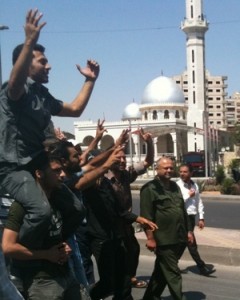As the FPA Blog site is going under the knife in about an hour, I won’t have time to put up a full post today. However, I wanted to get something up before the anesthetic sets in.
As readers of yesterday’s post know, signs were pointing towards a governmental attempt to seize the reform narrative. There even appeared to be US support for this track, as whispers of a proposal for political dialogue received quiet approval from the State Department.
Apparently that wasn’t enough for large segments of the Syrian population, as Friday saw the largest set of protests since the Uprising began.

Anti-government demonstrators took to the streets of Damascus Friday, July 1st as part of the largest outpouring of public discontent to date.
Not only did protester numbers surge across the country, but Aleppo saw large scale demonstrations for the first time. Very significant.
The Regime’s response leaned heavily on the use of violence once again, as the death toll currently stands somewhere between 14 and 24 according to human rights observers. The use of the military to silence protesters will have to stop completely before any political dialogue process can begin.
In even more disturbing news for the regime, cases of civil disobedience and lawlessness are increasing. A suburb of Damascus has issued a public statement refusing to pay government utility bills, many are openly disregarding civil regulations, and public services are being neglected. The Regime has long claimed to be only source of stability within Syria, however, ongoing lawlessness poses an obvious threat to that central claim to legitimacy.
Expect more once the effects of our facelift has worn off.